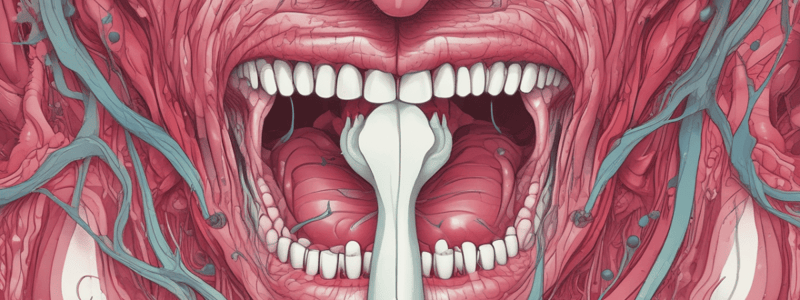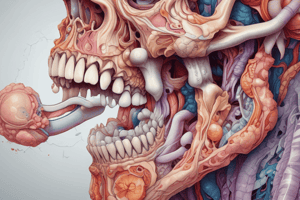Podcast
Questions and Answers
What type of nerves do catecholamine fluorescence show?
What type of nerves do catecholamine fluorescence show?
- Parasympathetic nerves
- Sensory nerves
- Motor nerves
- Sympathetic nerves (correct)
Which of the following stimuli may cause salivary secretion?
Which of the following stimuli may cause salivary secretion?
- Visual
- Hearing
- Gustatory (correct)
- Thermoreceptive
What is the relationship between salivary flow rate and masticatory forces?
What is the relationship between salivary flow rate and masticatory forces?
- Salivary flow rate is independent of masticatory forces
- Salivary flow rate is inversely proportional to masticatory forces
- Salivary flow rate is directly proportional to masticatory forces (correct)
- Salivary flow rate is exponentially related to masticatory forces
Who first studied the masticatory-salivary reflex in man?
Who first studied the masticatory-salivary reflex in man?
What type of nerve endings are implied in the periodontal ligament?
What type of nerve endings are implied in the periodontal ligament?
What is the primary difference between Parotid saliva and Submandibular/sublingual saliva?
What is the primary difference between Parotid saliva and Submandibular/sublingual saliva?
What is the effect of olfactory stimulation on salivary flow rate?
What is the effect of olfactory stimulation on salivary flow rate?
What is the name of the reflex that occurs when chewing on one side stimulates saliva secretion on the same side?
What is the name of the reflex that occurs when chewing on one side stimulates saliva secretion on the same side?
What is the term for the phenomenon where a stimulus that is not normally associated with salivation can cause salivation?
What is the term for the phenomenon where a stimulus that is not normally associated with salivation can cause salivation?
What is the primary difference between a conditioned reflex and a true reflex?
What is the primary difference between a conditioned reflex and a true reflex?
What is the primary reason why the 'mouthwatering' sensation is not considered a true reflex?
What is the primary reason why the 'mouthwatering' sensation is not considered a true reflex?
Which of the following is NOT a type of salivary gland?
Which of the following is NOT a type of salivary gland?
What type of salivary glands are affected by the olfactory-submandibular salivary reflex?
What type of salivary glands are affected by the olfactory-submandibular salivary reflex?
Which of the following odors had the highest flow rate in the submandibular salivary glands?
Which of the following odors had the highest flow rate in the submandibular salivary glands?
What is the name of the scientist who received the Nobel prize in 1904 for his studies on reflex salivary and gastric control?
What is the name of the scientist who received the Nobel prize in 1904 for his studies on reflex salivary and gastric control?
What is the term for the process by which the brain learns to associate a neutral stimulus with an unconditioned stimulus to elicit an unconditioned response?
What is the term for the process by which the brain learns to associate a neutral stimulus with an unconditioned stimulus to elicit an unconditioned response?
What is the term for the flow rate of saliva in the parotid gland?
What is the term for the flow rate of saliva in the parotid gland?
What is the name of the reflex that is elicited by the stimulation of gustatory receptors in the taste buds?
What is the name of the reflex that is elicited by the stimulation of gustatory receptors in the taste buds?
Flashcards are hidden until you start studying




